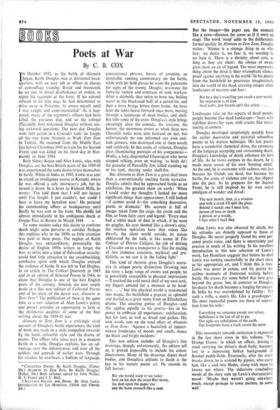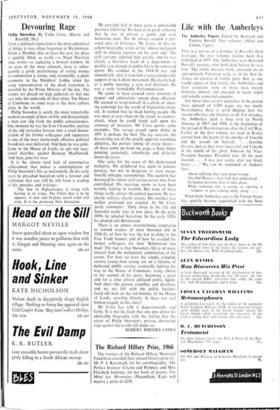But the images—the paper eye, the stomach like a cave—distance
the scene as if it were on stage. The word 'weep' adds to the deliberately formal quality. In Alamein to Zem Zem, Douglas writes : 'Silence is a strange thing to us who live: we desire it, we fear it, we worship it, we hate it. There is a divinity about cats, as long as they are silent: the silence of swans gives them an air of legend. The most impressive thing about the dead is their triumphant silence, proof against anything in the world.' In his poetry from the battlefield he penetrates imaginatively into the world of the dead, creating unique silent landscapes of mystery and fear:
But by a day's travelling you reach a new world the vegetation is of iron
dead tanks, gun barrels split like celery . . .
Landscapes take on the aspects of dead people, people become like dead landscapes—laces with sightless doors/for eyes, with cracks like tears/ oozing at corners.'
Douglas developed surprisingly quickly from his earlier decorative and pictorial schoolboy poems to his mature technique. His late poems have a wonderful rhetorical drive, the ceremony of the language accepting and overcoming death. Douglas's knowledge of death enhances his love of life. As he views corpses in the desert, he is made more aware of his own 'burning mind.' At the end,-he is overcome with sadness, not just because his friends are dead, but because the battle, the arena of violence and joy, has slipped into the past. As he prepares for the Second Front, he is still inspired by his own weird amalgam of wonder and dread :
Philip Snowden. By Colin Cross. (Barrie and Rockliff, 50s.) THAT a political reputation is the most ephemeral of things is very often forgotten at Westminster. When a Member dies or loses his seat, his place is quickly filled, as easily—as Nigel Nicolson once wrote—as replacing a broken window. In the case of the most eminent, there is subse- quently a grisly performance of voting money to commission a statue, and, eventually, a glum ceremony in the Members' Lobby when the stony representation of the dead statesman is unveiled by the Prime Minister of the day. The statues are placed on high pedestals so that one sees only the underside of their chins. The House of Commons in some ways is the most callous place in the world.
Philip Snowden is surely the most remarkable modern example of how swiftly and devastatingly a man can slip from the public consciousness. One moment he was the Iron Chancellor, putting all his old revivalist fervour into a cruel denun- ciation of his former colleagues and supporters in one of the most shatteringly effective political broadcasts ever delivered. And then, he was gone. Gone to the House of Lords, to spit out occa- sional diatribes against Ramsay MacDonald. And then, gone for ever.
It is the almost total lack of constructive achievement that makes a contemplation of Philip Snowden's life so melancholy. In his early years he preached Socialism with a fervour and exaltation that can still be felt from a reading of his speeches and writings: The Sun of Righteousness is rising with healing in its wings. The Christ that is to be appears. A new and brighter social order will arise. It is the promised New Jerusalem. He certainly had in those years a remarkable personal following. We have it on good authority that he was in private a gentle and even humorous man. Yet he always exuded a per- sonal aura of bitterness. Mr Cross, in this ex- cellent biography, writes of his 'almost malignant skill in making enemies on his own side.' His civil servants admired him greatly, and he was clearly a first-class head of a department (a quality rare enough in public life to be remarked upon). His conduct in the 1914-18 war and immediately after it won him a very considerable support in the Labour movement. He clearly had, at a public meeting, a very real charisma. He was a truly formidable Parliamentarian.































 Previous page
Previous page